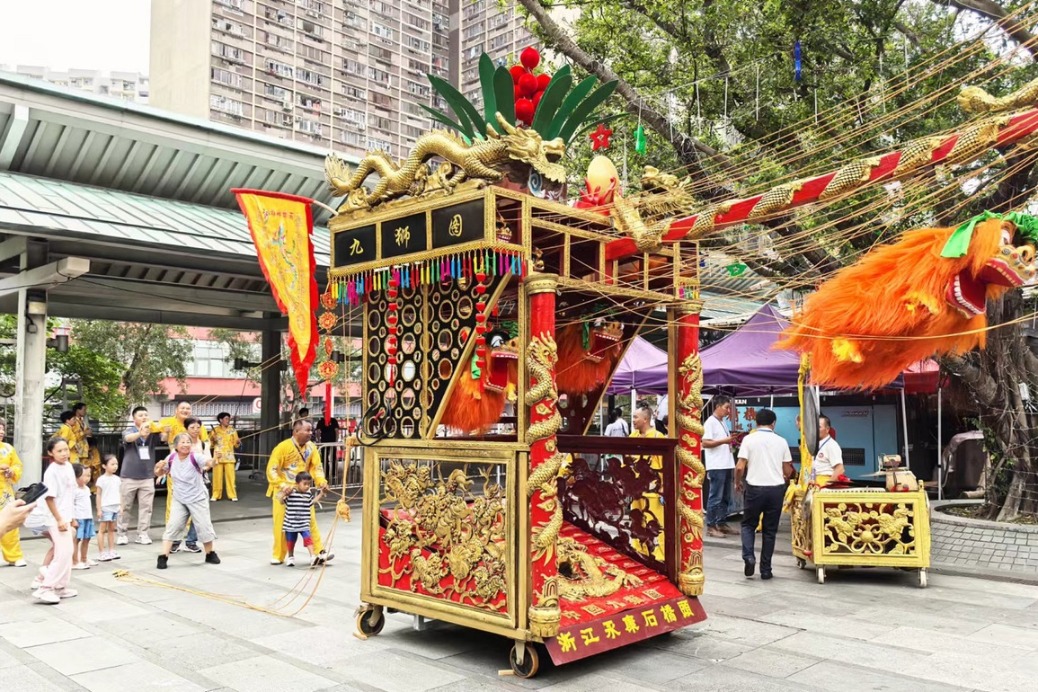Vietnamese student fulfills Chinese dream
Postgraduate at Wuhan university hosts Mandarin courses online for parents and children from her home country

Nguyen Thi Phuoc, a Vietnamese student at Zhongnan University of Economics and Law in Wuhan, Hubei province, will graduate next year, fulfilling her decade-long dream of earning a postgraduate degree in international Chinese language education.
Born and raised in Bac Ninh province, home to many large Chinese enterprises, Phuoc and her friends often met Chinese people. They shared photos of Chinese scenery and cuisine, which aroused their curiosity and led them to choose Chinese language as their major in university. "Mastering Mandarin often means more job opportunities," she said, noting that her cousins had also followed this path.
Upon graduating from Hanoi Open University in 2015, Phuoc initially planned to continue her studies in Chinese language. However, China Railway Sixth Group offered her a job as a translator, so she decided to start working first. At work, Phuoc witnessed most of the construction process of Vietnam's first light rail, from the piling stage to the final decoration. "This job was a bit challenging for me, as I'm not only dealing with unfamiliar vocabulary, but also with new things that have never appeared in Vietnam," she said.
At first, she couldn't tell "station hall" from "station platform", since both "hall" and "platform" in Vietnamese refer to public places where people wait. But they are completely different in the engineering budget sheet. "When the light rail was first introduced in Vietnam, the language was not yet prepared for it. Therefore, experts from both China and Vietnam worked together to come up with Vietnamese translations to address this issue," Phuoc said.
Following the completion of the light rail line in 2021, Phuoc moved to Wuhan, where she established an online group to teach Mandarin to Vietnamese parents and their children, amid the growing interest in learning Mandarin among her fellow citizens.
The online group has grown to over 2,000 active members who regularly engage in daily language learning activities. They share nursery rhymes and graded readings, and some have even formed sub-communities tailored to different age groups. The parents also share videos of their children practicing spoken Chinese with Phuoc, and ask for advice.
"It makes me feel so happy to see the children reading aloud with enthusiasm and vividness," she said.
To pursue further studies in Chinese language education, Phuoc applied for and received a Chinese government scholarship last year to study at Zhongnan University of Economics and Law.
Her family was hesitant to support her academic pursuits as extensive reading may further damage her already fragile eyesight.
"I was blind for about a year in my second year of junior high school," Phuoc said. "Fortunately, I was able to partially regain my vision through medication and adjustments."
Phuoc said the friendly exchanges between Vietnam and China are a growing trend, and she hopes to contribute to the development of Chinese-language teaching materials and curricula in Vietnam.
Starting this year, Chinese language has been included as a compulsory subject in the third and fourth grades in Vietnam, making it the fifth country to incorporate Chinese into its compulsory education.
While teaching Mandarin online to her fellow citizens, Phuoc often arranges a Q&A session where parents and children can ask her about China. "They are so curious about Chinese technology and customs that they would always come to me with questions after watching the videos about China that I shared on social media," she said.
Phuoc has also noticed a rise in the number of Vietnamese companies setting up operations in Wuhan.
Last year, Phuoc also took up the study of the guqin, a traditional Chinese musical instrument she has long admired. Despite the initial challenges, the serene sounds of the guqin and the cultural narratives embedded in its music bring her peace.
Learning the guqin and Mandarin was difficult in the beginning, but with patience and faith, positive changes will happen over time, Phuoc said.
"It was like I initially thought Wuhan locals were quarrelsome, but later I realized it was the vivacity and assertiveness stemming from the city's dock culture," she added.
Contact the writers at pengchao@chinadaily.com.cn
- Grand ceremony marks Confucius' birthday in Zhejiang
- China to see cooler weather but favorable travel conditions over National Day holiday
- Music video showcases Wuxi's heritage, progress
- Expert: Raising retirement age unlikely to affect employment opportunities
- Pingtan center a key stop for Taiwan compatriots seeking mainland qualifications
- Over 5,000 artists to take part in Shanghai festival





































